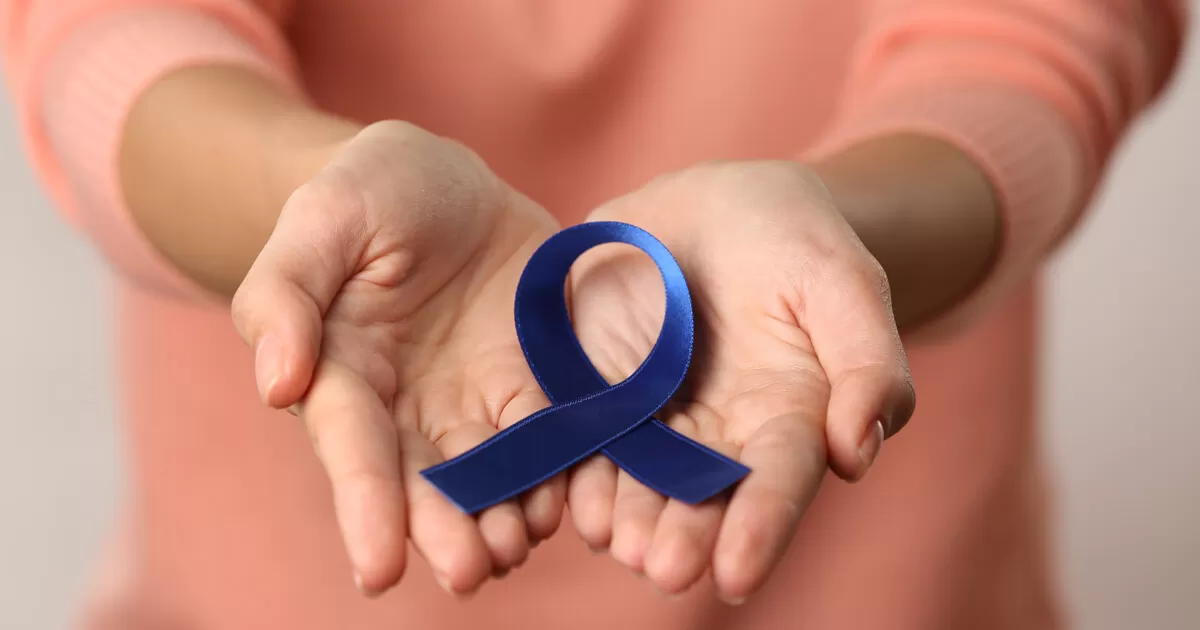Facts About Colorectal Cancer

What is colorectal cancer?
Colorectal cancer (CRC) starts in the colon or rectum. It is sometimes called colon cancer or rectal cancer, depending on where the cancer starts. Generally, if it starts in the last several inches of the large intestine (close to the anus), it is rectal cancer. They are often grouped together because they are similar in terms of how they appear, how they’re monitored by healthcare providers, and how they’re treated.

How does CRC develop?
Most CRCs start as a growth, called a polyp, on the inner lining of the colon or rectum. Some, but not all, types of polyps can change into cancer over time. If cancer forms in a polyp, it can grow in the colon and/or rectum and then spread to the wall of the intestine, the lymph nodes, and other organs. The severity of the cancer is determined by how far the cancer has spread.
Regular screening tests can help your healthcare provider find and remove polyps as soon as possible. These screenings can also help find CRC early, when it is highly curable. Examples of screening tests are testing your stool for the presence of small amounts of blood as well as a colonoscopy, which is a test where a gastroenterologist (a doctor who specializes in treating diseases of the gastrointestinal tract and the liver) examines all parts of the colon and rectum with a very small camera called a scope.
What are the risk factors for CRC?
The risk factors for CRC can be separated into 2 groups: those that people can change (lifestyle-related) and those that people can’t change. It is important to remember that not everyone who has a risk factor will develop CRC and even those who do not have these risk factors may still develop CRC.
Risk factors that people can change include:
- Certain diets, such as a diet that includes a lot of red meats (beef, pork, lamb, or liver) and processed meats (hot dogs and some luncheon meats).
- Being overweight or obese.
- Physical inactivity.
- Smoking.
- Heavy alcohol use (limit alcohol use to no more than two drinks a day for men and 1 drink a day for women).
Talk with your healthcare provider about any lifestyle-related risk factors that you may have.
Risk factors that people can’t change include:
- Aging.
- A personal history of colorectal polyps or CRC.
- A personal history of inflammatory bowel disease.
- A family history of CRC or colorectal polyps.
- Having an inherited gene change (mutant gene) that can cause cancer in members of a family.
- Your racial or ethnic background including being African-American or Jewish of Eastern European descent (Ashkenazi Jewish).
While these risk factors cannot be changed, appropriate screening tests can help your healthcare provider find and treat CRC.
What are the chances a person will get CRC?
Other than skin cancers, CRC is the third most common cancer diagnosed in both men and women in the United States. About 1 in 21 (4.7%) men and 1 in 23 (4.4%) women will develop CRC over their lifetime.
Although CRC is most often found in people over 50, the results of a recent study suggest that the CRC incidence in the U.S. is increasing among young adults. More research is needed to understand why, but some possible reasons include an increase in obesity, sedentary lifestyle, and poor diet. Though less common, other possible reasons younger people develop CRC include inherited disorders such as familial adenomatous polyposis (FAP) which accounts for about 1% of all CRCs and Lynch Syndrome which accounts for about 2% to 4% of all CRCs.
What can I do to help myself?
There are 3 things you can do to help protect yourself from CRC:
Get regular CRC screenings. It usually takes several years for polyps to develop into CRC. By having regular screenings, your healthcare provider may be able to find and remove most polyps before they turn into cancer. In the event that cancer has already formed, early detection as a result of screenings can lead to a higher likelihood of curing it.
People who aren’t at an increased risk of CRC should start screenings at age 50. People who have an increased risk might benefit from starting screenings at a younger age.
- Know your family history. Your risk of CRC is higher if you have a close relative who had or has CRC or colorectal polyps. It is particularly higher if a close relative developed colorectal cancer before the age of 45. Talk with your parents, brothers, sisters, grandparents, aunts, uncles, and cousins to learn who had cancer and how old they were when it was diagnosed. Share this information with your healthcare provider and talk with him or her about when you should begin screening, which tests to have, and how often you should be screened.
- Know the symptoms. Look at your stool for blood (the stool may look dark or bright red) and for changes in stool quality such as narrow stool that lasts for more than a few days (this may be a sign of narrowing of the colon due to cancer). Other signs of CRC may include:
- Rectal bleeding with bright red blood or dark and tarry stools.
- A change in bowel habits such as diarrhea or constipation that lasts for more than a few days.
- Stomach pain or cramps.
- Unintended weight loss.
- Feeling weak or more tired than usual.
- Feeling that you need to have a bowel movement that doesn’t go away after you have one.
If you have any of these symptoms, don’t ignore them! Talk with your healthcare provider right away (and get a second opinion if needed).
[1][2][3][4][5][6][7][8][9][10][11][12][13]
References
- 1. American Cancer Society. What Is Colorectal Cancer? Accessed June 29, 2017.
- 2. American Cancer Society. Colorectal Cancer Stages. Accessed July 25, 2017.
- 3. American Cancer Society. Can Colorectal Polyps and Cancer be Found Early? Accessed July 25, 2017.
- 4. American Cancer Society. Can Colorectal Cancer be Prevented? Accessed June 29, 2017.
- 5. American Cancer Society. Colorectal Cancer Risk Factors. Accessed June 29, 2017.
- 6. American Cancer Society. Key Statistics for Colorectal Cancer. Accessed June 29, 2017.
- 7. Centers for Disease Control. Colorectal Cancer Screening. CDC Publication #99-6949. Revised April 2017.
- 8. Siegel RL, Fedewa SA, Anderson WF, et al. Colorectal cancer incidence patterns in the United States, 1974-2013. JNCI J Natl Cancer Inst. 2017;109(8):1-6.
- 9. Colon Cancer Coalition. Cancer and Genetics: Your Family History. Accessed July 25, 2017.
- 10. American Cancer Society. Colorectal Cancer Signs and Symptoms. Accessed July 5, 2017.
- 11. National Library of Medicine. Rectal Cancer (Rectal Carcinoma): Symptoms. Accessed September 19, 2017.
- 12. American College of Gastroenterology. What is a Gastroenterologist? Accessed September 19, 2017.
- 13. Centers for Disease Control and Prevention. Frequently Asked Questions. Accessed October 13, 2017.





